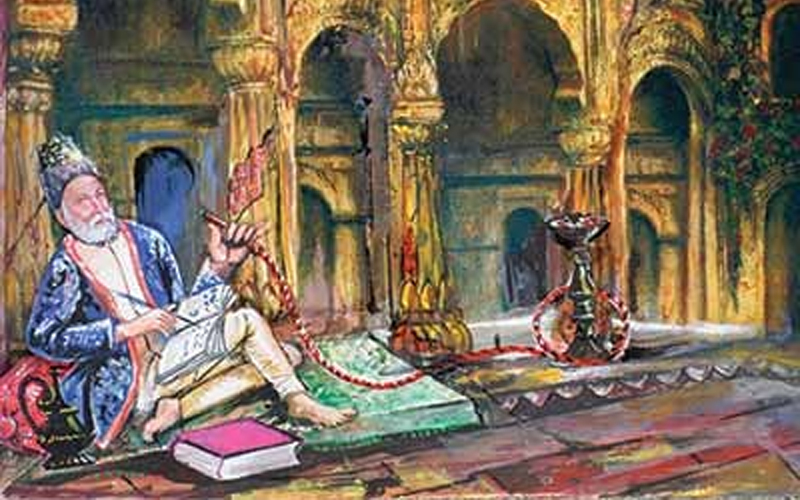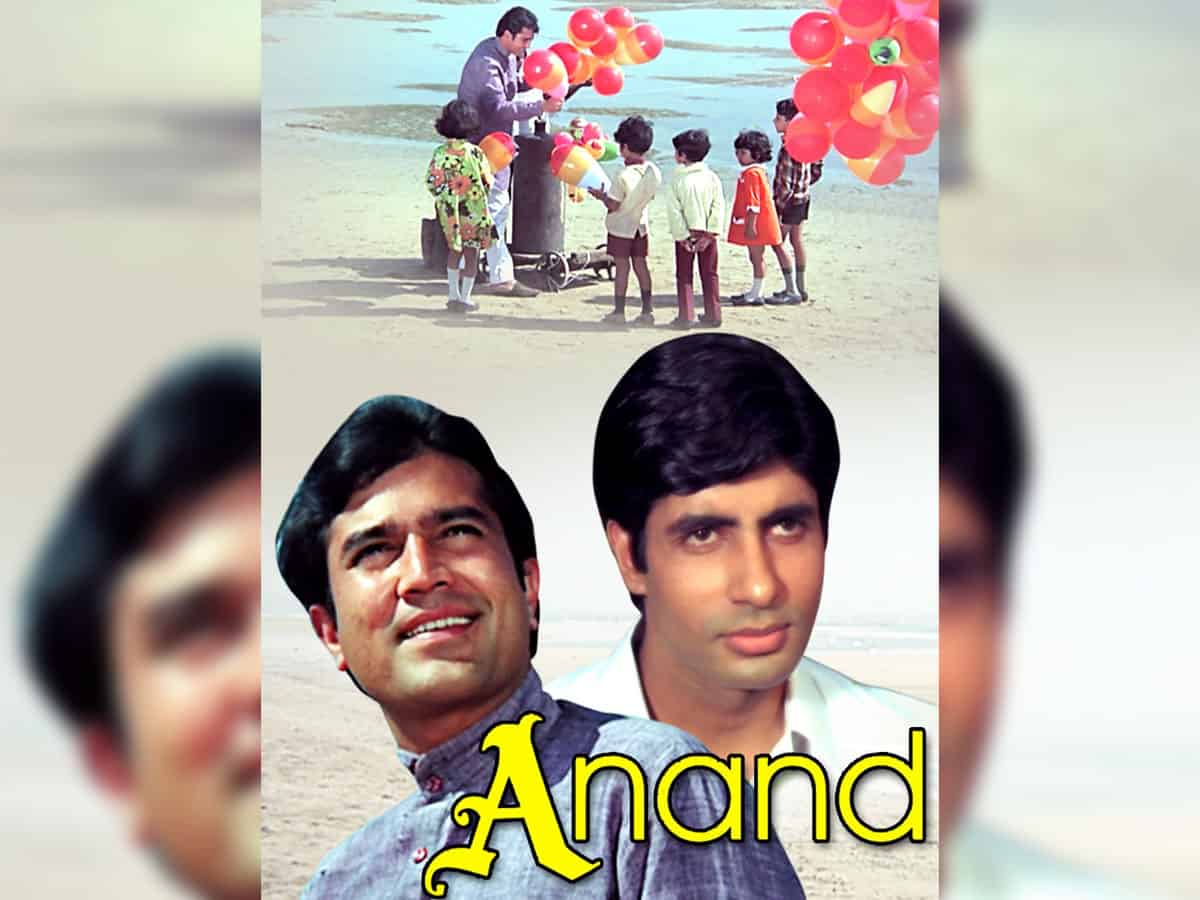Asma Anjum Khan
It was fifty years of Anand.
That famed movie where Rajesh Khanna plays the role of a man who knows he was going to die in the next six months.
But aren’t we all Anands in some way? Anand was on a precipice, about to fall; while most of us are on standby.
We don’t know whether it would be six decades, six years, six months, six weeks or whatever to reach there.
This is a suspended relief; where we know there is no immediate urgency for us to die due to lymphosarcoma.
Isn’t it a relief to not know our time exactly?
This, ‘unknowing’ is pure bliss.
We know, Apun ka time aaye ga, but when?
Lest I know the exact day and time of my passing away, I might cease to live today.
But, Anand didn’t.
He lives with gusto with loads of vigour.
Who can snatch away those hundreds and thousands of seconds that I am going to live in the next six months, he asks.
That is what I call, some attitude.
Who has stopped us, anyway, from living?
What exactly constitutes, living?
Living is existing but existing is not living.
Anand is living but living the moments. While we, living our long lives, forget to live the moments.
Zindagi badi honi chahiye, lambi nahin (live the life generously and not prolonged).
Life indeed is to be found in the moments.
With Anand, there is no bickering, no bitterness–just simple acceptance.
Anand could not be without sorrow for his condition, granting that; his suave and smooth talk radiates a sparkling confidence that engulfs his immediate environment and we can no more see anyone else but only Anand.
Anand means उल्लास, खुशी, हर्ष, मन का सुख। and he personifies that.
How many such personification can be found amongst us today?
Living with a condition that simply couldn’t be turned off, living with joie de vivre, despite it and spreading radiance.
Most of us are in a permanent lament mode, regretting this, fidgeting over that and possibly fuming within; over things that were never in our control and perhaps were never meant to be.
Our Pharaoh like egos do not let us a moment of respite, we wish to be the gods of our own small worlds.
Gods that usually show little mercy and behave erratically. This is how, He behaves, right? They tell themselves.
For each *Sisyphus is his mountain. He is busy carrying and even enjoying it.
Ghalib has said something for every occasion of this drama called life.

Rañj se ḳhūgar huā insāñ to miT jaatā hai rañj ;
(If a human being gets accustomed to grief, then grief disappears/ I suffered so many hardships, that they became easy to bear)
Mushkileñ mujh par paḌīñ itnī ki āsāñ ho ga.iiñ
Some Sisyphuses lose their sense of burden over time. It becomes their second nature.
Can we live without our mountains? Our sorrows?
Is it that essential a burden that we all have learned to carry, either lamenting or pretending we don’t just have it?
It is sorrow that has given a special meaning to our life; it is sorrow that has given us some of our grand poetry, some grand philosophy of life, nay ‘how to be best of the Sisyphus.’
How difficult it is to live your sorrows?
When our Bard says,
qaid-e-hayāt o band-e-ġham asl meñ donoñ ek haiñ/
maut se pahle aadmī ġham se najāt paa.e kyuuñ
If that is what it is, then why not carry along our sorrows and not just hauling them, like that famed donkey?
Let’s celebrate our sorrows.
*Our sweetest songs are those that tell of saddest thoughts.
Sorrow gives us a unique realization of life, unmatched like any other. It also gives us a deeper understanding of the things, happenings that keep popping around us at their own pace.
In the renewed light, life starts to seem a subtle shade brighter.
To compare our sorrows and feeling more miserable, is the mental time pass game, we often play in our minds.
*Bhala uski qameez meri qameez se, safed kaise?
(How come his shirt is whiter than, mine?)
Some of us compete; measuring each other’s sorrows.
But to each his own.
I love my sorrow more, and believe it to be finer and deeper.
You may find someone regretting not doing his annual US trip, someone ruing the paucity of funds for the medicine.
Whose regret is greater? Whose sorrow is deeper?
Men differ, their sorrows differ more.
Our line of grief that runs through our lives, seems longer to each one of us, we just can’t make it small by comparing it.
Coming back to Anand, what made him carry his burden with such aplomb?
Acceptance.
Acceptance is the key.
Does sorrow wither away once we accept it?
No.
Sorrow neither wilts nor withers away. It only keeps changing its shades.
Call it a chameleon.
Some seasons of sorrow, come with darker hues, some carry the lighter tones, some moments are extraordinary and the sorrow makes you smile.
Yes, it does.]
You remember a visage, you miss a wink, and you long for that look, those hours that you spent speaking, the laughter you had together, and that hair splitting bickering.
After each such bout, you feel more alone. Then the humdrum of life makes you numb to it. It keeps badgering your brain, hammering in thoughts but you have to cook clean and then go to office.
Priorities matter.
Initial days are definitely harder, but then we get used to it.
But don’t ever get fooled by this gentleman, called Mr. Sorrow wearing long coats with large deep pockets and a mysterious looking hat; he never leaves you alone.
He keeps knocking at your door.
You are never sure when. You are at a party, at a friend’s or working, even sleeping, the gentleman knocks, sits with you and forces a conversation.
Yes, sorrow compels you to talk to your own self, thus bringing you closer to yourself. It poses questions, brings you to your knees and then makes you feel triumphant.
It taps on your shoulder lovingly and asks for a reward.
The award goes to you, for carrying your sorrow ‘along’ and not just hauling and dragging it, like Sisyphus.
This is what sorrow does for you.
It brings you face to face with that miserable witch called life,
And then sorrow becomes your best friend.
*Sisyphus(or Sisyphos) is a figure from Greek mythology who, as king of Corinth, became infamous for his general trickery and twice cheating death. He ultimately got his comeuppance when Zeus dealt him the eternal punishment of forever rolling a boulder up a hill in the depths of Hades.
(My description: Carrying Pushing a boulder up the mountain ceaselessly, thus symbolizing the basic absurdity called life)
Asma Anjum Khan is from Maharashtra and teaches English. She has been writing on social, ethical, and gender related issues. FEEL (Foundation for English and Ethical Learning) is her NGO that wants to bring about change by equipping people with the leaning of English. Twitter: @AsmaAnjumKhan

